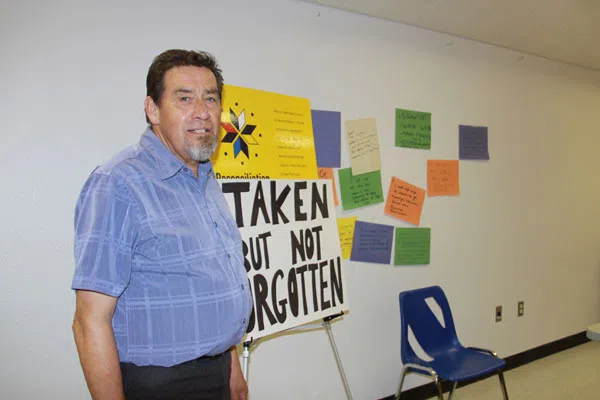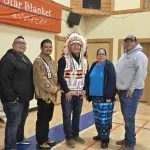
Missing people remembered
“I
am not untouched by missing people,” noted Harry Lafond of the Office of the
Treaty Commissioner, opening speaker for a Reconciliation themed night focused
around missing and murdered Indigenous women and girls. One of his cousins
disappeared in the 1950’s, last seen climbing aboard a train to go to Prince
Albert from Marcelin. Nobody has been able to say what happened to her in the
past 60 years. His best friend also went missing in 1975, and has never been
found.
“It’s
not something that goes away. It’s not something you can let go of.”
He
spoke of how people have been treated since the treaty-signings, where the
dream and vision of sharing the land in harmony and being related has been
thrown out of balance by greed, power, and money.
“Not
just the Indigenous people but the settlers as well — it has thrown everything
out of balance, and as soon as something is out of balance you experience
unwellness. Pain. Suffering. Behaviour that is intended to hurt. That lack of
balance is what we’ve inherited from the Indian Act, the Residential Schools
that took one sentence of the treaty and twisted it to suit the interests of
the more powerful,” he explained, adding that this means a lack of respect for
all people, and respect between genders. “Women had a very strong role to play
in the democracy.”
Related:
-
Iskwewuk E-Wichiwitochik marks 10 years of supporting, advocating for families of MMIW
-
Liberal government says extensive consultations will precede national inquiry into MMIW
-
RCMP releases 2015 review of MMIW cases; Indigenous women still over-represented
Lafond
suggested we must return to the grandmothers’ voices again, so that men can
embrace an Indigenous society where we complement each other, not dominate,
oppress, or abuse, so as to rebuild families and live out the real dream of the
treaties.

After
Lafond spoke, Patricia Whitebear, Darlene Okemaysim-Sicotte, and Myrna LaPlante
all shared stories as relatives of disappeared or murdered women.
“This
is my forever lifetime commitment, my call of action,” noted Whitebear. “It’s
to bring awareness to yet another injustice of Indigenous families. We all have
family albums. Just imagine your family with one person missing every holiday,
Christmas, that person is not there. No one should feel that pain.”
Okemaysim-Sicotte
tied the issue directly into the legacy of Indian Residential Schools.
“Suffering
from the IRS seeks to share the harsh reality and the links to colonization
including the IRS and social environments. Many women today continue to be
challenged by safety and survival.
Colonial policies have attacked culture, way of life, way of being.
Traditional roles were undermined along with the dispossession of traditional
territories and roles and responsibilities, leaving women out of decisions,”
she noted. “Genocidal policies are linked to the disappearance of hundreds of
women.”
LaPlante
spoke about the life and contributions of her Aunt Emily who went missing at
age 76 in 2007 and has yet to be found.
“Once
she went missing, it was total disbelief, how can someone go missing from their
safe rural home and just vanish?” asked LaPlante. “We need to honour these
memories of these people who are missing and murdered and we need to remember
the things that they have done, the contributions they have made during their
lifetime, whether it was long or short.”

The
gathering then broke into small groups to discuss reconciliation, and make
resolutions on taking action, with opportunities to take “selfies” of their
resolutions next to the OTC Reconciliation posters, or the “Taken but not
Forgotten” poster board created by the organizers of the evening, Iskwewuk
E-Wichiwitochik. The evening ended with a round dance led by Joseph Naytowhow
and his sister Violet.

